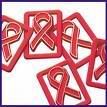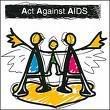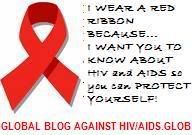I read a post over at Chichi’s in the (2nd and 3rd paragraphs) about the Red ribbon she wore on world AIDS day.
In the post, a much older colleague of hers asks her why she’s “advertising” her status with the ribbon. By this, that guy obviously meant that by Chichi wearing the Red Ribbon symbolised her infection with HIV/AIDS and positive living. This is very astonishing coming from someone that lives in Uganda (a country that has fought the HIV/AIDS virus so hard that the scars will never go away.) This guy works for a humanitarian organisation that provides food and aid to people in need. Most of these people in need are HIV orphans and victims.
Being an employee of this organization alone should bring him into close proximity with HIV patients almost everyday. And he still asks why she is “advertising” her status? And given that this man is higher than her in both age and seniority makes it a disgusting thing that he said that. I’d understand if it came for a 15 year old. But him?
Stigma is the biggest obstacle in the success in the fight against AIDS in the world. Stigma is the open aggression towards HIV/ AIDS. It is what we called “Pointing fingers” way back when AIDS had just hit. Way back when every “thin” person, or anyone with a cough or fever was suspected of having “silim”/Slim". It is this that gave the sufferers that embarrassment they suffered when they learnt that they were infected with the virus. I learnt that when u point one finger at someone, the other 3 are pointing right back at u.
Further down in Chichi’s post, there is another female colleague of hers that says that “she can never be close to an HIV positive person.” I think this is very careless and ignorant of her. It borders on illiteracy. When we were children (about 9 yrs olds) we hid from our relatives that were thought to suffer from AIDS. Because we thought they would infect us if they touched us. That was then. HIV was not talked about then and we could be excused for our actions because we were very young then and we had not been educated about HIV. For someone to still speak of such in this day and age is short of stupid.
In the past decade, there has been a huge transformation. 2 decades ago, when people found out that they were infected, most of them took their own lives because they saw HIV/AIDS as a death sentence. Infected people were excommunicated and shunned by everybody, including their relations. Suicide was seen as a way out.
When the government of Uganda fought AIDS by fighting stigma, this was a well aimed arrow. These days, many “high” society people are living positively with HIV and are well known activists. An example is ActionAid’s Beatrice Were. HIV should no longer be seen as a curse of a death sentence. It should be seen as a manageable illness. Just like Asthma.
I still think that the fight against AIDS is one that will never end if we still have adults that think like 5 year olds in this era of sensitization.
- Cheri
Tuesday, December 11, 2007
Saturday, December 1, 2007
Still Keeping the promise...
Thank you for putting up a brave fight. However, we need to re-arm now.
How time flies; it feels like just the other day that I talked about the Red Ribbon for the first time. And a year has gone by already. Another year and more good news on the HIV battle front. Well, not entirely good news. It’s just Uganda that’s doing well in that war. It’s shouldn’t be just Uganda that does well, the whole world should be ululating and jumping with joy. The prevalence rates in Uganda have fallen drastically from 21percent to 7 percent between 1991 and 2004. With this result, Uganda; which was once seen as one of the worst affected countries; is seen as a huge success story in the global fight against AIDS? This is a direct result of the awareness campaigns mounted by the government with assistance from international grants and donations. However, in countries like Jamaica, Dominican Republic Zambia and Senegal, the prevalence rates are soaring. Perhaps they should adopt the steps Uganda took to fight this disease.
Aside from all the campaigning and marketing, the Red Ribbon still continues to cause waves. Like the poppy campaign in Britain to remember World War heroes, the ribbon is worn in remembrance of the dead, the people living positively with AIDS and it also helps as a reminder to people of the danger of AIDS.
Teenagers here completely disregard whatever is said about protection. According to some sources most teenagers are more afraid of unwanted pregnancy than they are of contracting the virus. On a popular talk show here, the Jeremy Kyle show which features mainly adolescents with issues such as child custody, drug addiction, multiple sex partners and teenage pregnancies, most of the guests don’t really know much about HIV. Countries need to adopt stronger and more effective communication methods to get the vital information to the people in this age group as they are more in danger given their lax approach to sex.
People should stop thinking about HIV/AIDS as a disease that affects only people in developing countries as this stereotype only works to put them in danger. Reports show that the prevalence rates in Britain are rising faster than rates elsewhere in Europe.
It’s almost 4 decades since the HIV virus first hit and no vaccine has been discovered in spite of all the money and time sank into it. It has claimed more than 25 million lives worldwide. That is a little under the entire current population of Uganda. Each day, about 6000 children are orphaned. More than ¾s of these children are in Sub Saharan Africa and Asia. The statistics are sad. But statistics are not a way to win a war. Statistics only work to make staggering exaggerations.
The only statistics that matter to this fight are the increase in the number of people that choose to Abstain from sex until they get married; the number of people that choose to Be faithful to their partners and finally, the number of people that choose to use Condoms as a method of protection. As these numbers increase, HIV/AIDS will be kicked out for good hopefully.
Here’s to the continued fight against AIDS and stigma. And hopefully to an HIV free generation in 20 years.
-Cheri
How time flies; it feels like just the other day that I talked about the Red Ribbon for the first time. And a year has gone by already. Another year and more good news on the HIV battle front. Well, not entirely good news. It’s just Uganda that’s doing well in that war. It’s shouldn’t be just Uganda that does well, the whole world should be ululating and jumping with joy. The prevalence rates in Uganda have fallen drastically from 21percent to 7 percent between 1991 and 2004. With this result, Uganda; which was once seen as one of the worst affected countries; is seen as a huge success story in the global fight against AIDS? This is a direct result of the awareness campaigns mounted by the government with assistance from international grants and donations. However, in countries like Jamaica, Dominican Republic Zambia and Senegal, the prevalence rates are soaring. Perhaps they should adopt the steps Uganda took to fight this disease.
Aside from all the campaigning and marketing, the Red Ribbon still continues to cause waves. Like the poppy campaign in Britain to remember World War heroes, the ribbon is worn in remembrance of the dead, the people living positively with AIDS and it also helps as a reminder to people of the danger of AIDS.
Teenagers here completely disregard whatever is said about protection. According to some sources most teenagers are more afraid of unwanted pregnancy than they are of contracting the virus. On a popular talk show here, the Jeremy Kyle show which features mainly adolescents with issues such as child custody, drug addiction, multiple sex partners and teenage pregnancies, most of the guests don’t really know much about HIV. Countries need to adopt stronger and more effective communication methods to get the vital information to the people in this age group as they are more in danger given their lax approach to sex.
People should stop thinking about HIV/AIDS as a disease that affects only people in developing countries as this stereotype only works to put them in danger. Reports show that the prevalence rates in Britain are rising faster than rates elsewhere in Europe.
It’s almost 4 decades since the HIV virus first hit and no vaccine has been discovered in spite of all the money and time sank into it. It has claimed more than 25 million lives worldwide. That is a little under the entire current population of Uganda. Each day, about 6000 children are orphaned. More than ¾s of these children are in Sub Saharan Africa and Asia. The statistics are sad. But statistics are not a way to win a war. Statistics only work to make staggering exaggerations.
The only statistics that matter to this fight are the increase in the number of people that choose to Abstain from sex until they get married; the number of people that choose to Be faithful to their partners and finally, the number of people that choose to use Condoms as a method of protection. As these numbers increase, HIV/AIDS will be kicked out for good hopefully.
Here’s to the continued fight against AIDS and stigma. And hopefully to an HIV free generation in 20 years.
-Cheri
Subscribe to:
Posts (Atom)








